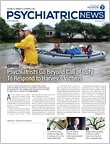Like many Americans, I spend a lot of time in my car, precious blocks of solitude that I use to listen to public radio, Audio Digest Psychiatry, and sometimes music. My husband prefers audio books, but for me, the radio connects me to the outside world without intruding on my privacy.
On a recent Sunday afternoon while driving home from a quiet weekend on the Chesapeake Bay, I was engaged in my usual habit of listening to the radio. The program was “Freakonomics,” and psychologist Angela Lee Duckworth, Ph.D., was being interviewed. Dr. Duckworth has spent the last several years studying successful individuals and trying to identify predictors of success. She is developing the notion of “grit” as a common element in success, which she defines as a passion and perseverance to achieve long-term goals.
“Grit” is not a new idea. Dr. Duckworth published a paper on grit in 2007, and she the recipient of a MacArthur genius award in 2013; her best-seller book, Grit: The Power of Passion and Perseverance, was published in 2016. As I listened to the interview, my attention turned from my customary practice of gearing up for another workweek and thinking about our APA and psychiatry in general—what we can do to support psychiatrists’ and other physicians’ well-being—to thinking that the concept of grit may be relevant in the promotion of well-being and management of burnout.
While success in medicine in general and psychiatry in particular can be measured in many ways, by Dr. Duckworth’s definition of grit, it is fair to assume that we have it. We have shown grit for a significant portion of our lives—we worked hard to succeed in college, medical school, and postgraduate training. We often went without sleep and even food as we put our patients’ needs first and single-mindedly soaked up all the knowledge we could from every resource available to us. The challenges didn’t stop there; we continue to persevere despite being overburdened by physician shortages, expanding administrative burdens, and the transition to new systems of value-based care.
Deeper into the “Freakonomics” interview, Dr. Duckworth described the four elements of grit: interest, practice, purpose, and hope.
“Interest” refers to having an enduring passion for a singular pursuit. People with enduring interest progress from novelty seeking involving a number of broad activities to intense interest in a focal area. Listen to a chef reflect back on her early experiences with cooking, and she will probably talk about trying complex recipes early and often. Most of us in psychiatry have a core interest in what makes humans think and interact the way they do.
“Practice” has to do with the notion of developing and improving skills in an area of interest over time. In his book Outliers, Malcolm Gladwell proposes that attainment of world-class excellence in an area requires 10,000 hours of deliberate practice. While that estimate has since been challenged, the important point is that hard work and attention to skill development over time are components of grit. All psychiatrists spend hours and hours learning and practicing their craft.
“Purpose” is defined as being driven by an interest beyond the self that has meaning to others. Purpose is a kind of social validation of an area of interest. Chefs find purpose when diners enjoy their meals; musicians when an audience enthusiastically applauds. The purpose of psychiatry is to alleviate the suffering and disability caused by mental illnesses, including addictions. This is of value to patients, their families, and our communities.
“Hope” is the final element of grit; it is the pursuit of an area of interest that is worthy of the time invested. It is the belief that one can overcome problems and challenges to stay focused on one’s goals.
Perhaps recognizing our grit and getting in touch with the four elements that Dr. Duckworth describes is one pathway forward to managing episodes of professional fatigue and burnout. Consider these questions: Why did you work so hard to become a psychiatrist? What was your interest? What memories do you have at working deliberately to become a great psychiatrist? What is your hope for your patients and for psychiatry? To what did you aspire when you first wanted to become a psychiatrist?
Take a few moments to practice mindfulness and let yourself contemplate the answers to these questions. The path you have followed is not for the faint hearted, and you have not only persevered but overcome many impediments to arrive at this point in your career. Savor that knowledge and figuratively or literally give yourself a pat on the back. If you have not done so already, now is the time to start proactively making decisions that protect and promote your well-being and help you achieve a healthy balance between your professional and personal lives. Only by doing so can you become the best you, able to offer your compassion and healing capabilities to all those who are in your orbit.
This is just a beginning. In the coming year, look for information on the tools and resources that APA is developing as part of my presidential initiative to address physician well-being and burnout . I welcome your feedback. ■

